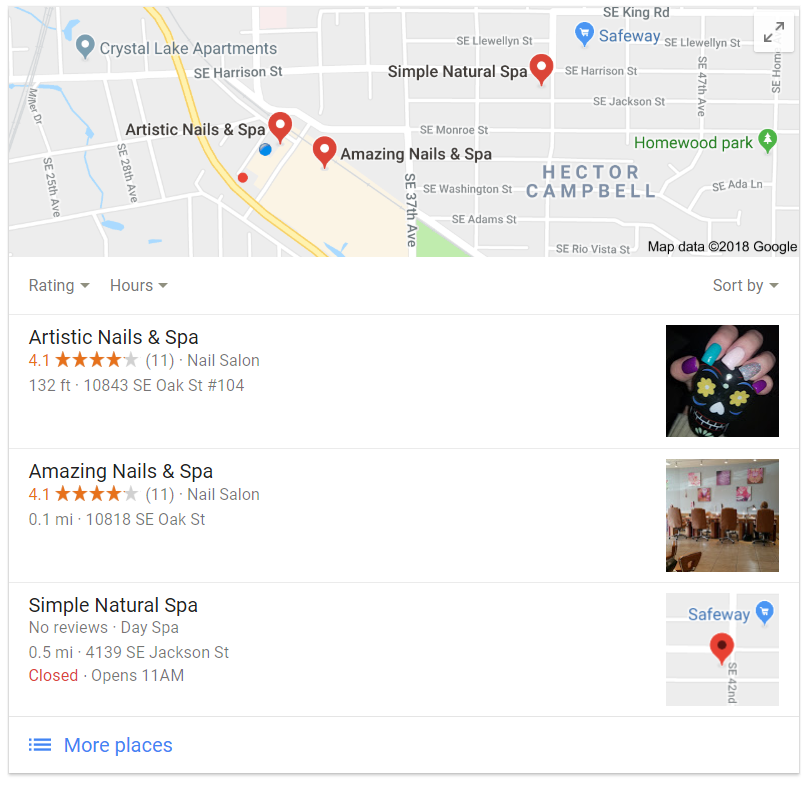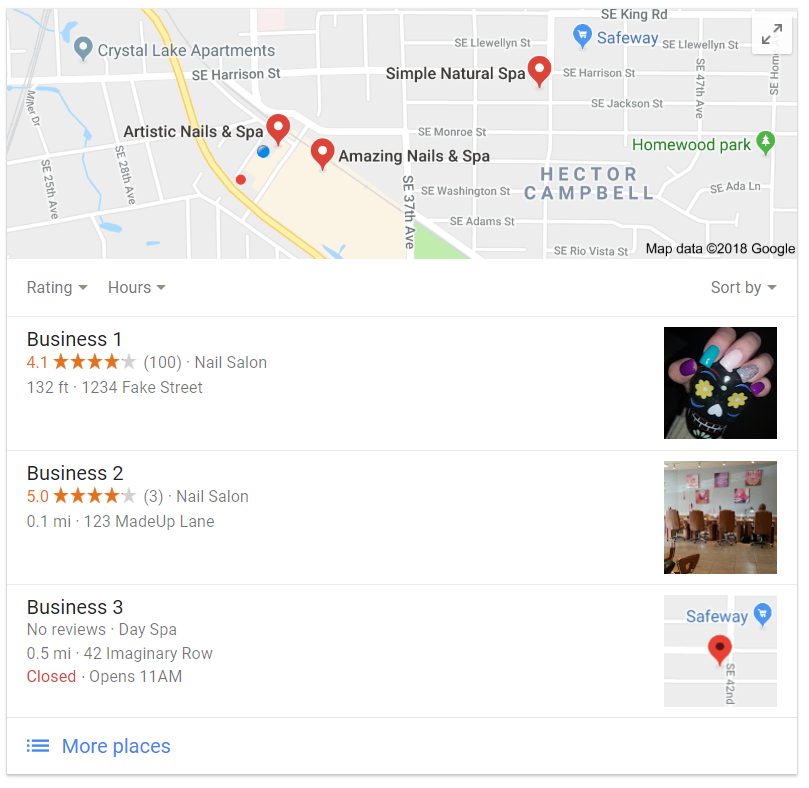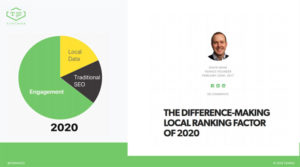The Local SEO landscape has seen significant changes over the past decade and in 2018, the old school tactics are no longer moving the needle. This article provides detailed actions for hotels and other businesses in the hospitality industry to optimize for local search.
What is Local Search?
When discussing search engine optimization (SEO) it is easy to forget how much of a hodgepodge of different services and techniques SEO actually is. SEO is seen as a monolith service when it is actually a latticed framework of different processes coming together to achieve specific results relating to a search engine functions and features.
In 2004 Google added a new feature to the search engine results page (SERP) that included a map of the local area and relevant business listings. The local search features appeared on the SERP when certain keywords were used. Keywords mentioning specific cities or locations triggered the local features. Keywords associated with businesses that are necessarily tied to a location also triggered the local feature.
This new SERP feature required new optimization techniques. To perform SEO on a website now required getting businesses that could benefit from location based searches into the local pack.
Local SEO Ranking Factors
In previous years, the key ranking factors related to building citations for your business. This meant finding every local directory and service and getting your exact business name, address, and phone number listed there. Citation building became a drain on time since many of these sources would pull in data from other websites which could alter the correct information. This extra data would also sometimes create duplicate entries with different variations of the business name.
I’m not going to sugarcoat it — local citations are still a mess and a headache. Even if you use a tool like Moz Local, duplicate entries, other businesses claiming your address, mix ups with phone numbers, all create extra work.
In 2017 Moz released a study on what it considered the most important factors in ranking for local search. This study divided the ranking factors into 2 categories: Local Pack/Finder Ranking Factors and Localized Organic Ranking Factors.
Local Pack/Finder Ranking Factors
- My Business signals
- Link signals
- On-page signals
- Citation signals
- Review signals
- Behavioral signals
- Personalization
- Social signals
Localized Organic Ranking Factors
- Link signals
- On-page signals
- Behavioral signals
- Personalization
- Citation signals
- My Business signals
- Review signals
- Social signals
What Do These Ranking Factors Mean?
Breaking down each ranking factor is best left to the more in-depth and complete ranking factor report published at Moz.com.
After processing all of this information, there are a few key elements we can focus on. The first is the importance of the website as the source of data Google uses for knowledge panels and local pack. For many businesses, the SERP is the new homepage, a place where all data, including data collected by third parties regarding the business is consolidated.
How Should the Hotel Website Be Set-Up to Optimize for Local Search?
A lot of what needs to be done on a site for local search also needs to be done for organic search.
- Keywords in page title tags and meta descriptions
- Keywords within the content of the pages (used in headers, used early in the text of the page, used in image alt tags)
- Clear site architecture
- Fast mobile-friendly website
- Relevant internal linking
This list is abbreviated, but gives a quick overview of the on-page elements an optimizer needs to pay attention to.
Use Schema Where Applicable
Schema is a method of marking up data on a website to help search engines understand the information they are parsing from the webpages they crawl.
There are a few types of schema hospitality businesses need to consider when setting up their websites.
Hotel Schema
Restaurant Schema
Day Spa Schema
Review Schema
There are dozens of ways to implement Schema, not all are actively used by Google or other search engines, so do not stress out over trying to apply every possible variation of schema on your website unless you have an in-house web developer who needs to be kept busy.
What Else Does a Hotel Need to do For Local SEO Optimization?
The following 4 actions are part of an effective local SEO strategy for any business in the hospitality industry.
Social Signals
It is 2018 and I still do not understand why this is still something we need to convince businesses to do, but apparently there are still a lot of companies out there that do not understand the power of social sites to help their business’s digital marketing.
David Mihm, founder of Tidings.com and once the curator of the Local Ranking Factors survey, was in Chicago speaking to a small group of digital marketers about local SEO. Within his comprehensive presentation he called out social media profiles as a necessary aspect of a local SEO solution.
He had one slide labeled ‘Minimum Social Profiles’. Included on this slide were the following social media platforms:
- Facebook – https://www.facebook.com/business/products/pages/
- Instagram – https://www.instagram.com
- Twitter – https://twitter.com/signup
- Pinterest – https://www.pinterest.com/business/create/
- LinkedIn – https://www.linkedin.com/help/answer/710/adding-a-company-page?lang=en
Wait! I can hear the screaming already. Blue Magnet recommends you do not activate social media platforms you do not plan on being active on. An abandoned or rarely updated social media channel looks bad. It is like letting the plants in your lobby wilt and die.
David Mihm has a solution for that issue, so you can gain the local SEO benefit of building out these social media profiles for your business and not mess up your social media strategy.
He said in his presentation, “If you don’t plan to be active on a particular channel, say so with a single post directing visitors to the channel where you’ll be most active…”
Simple and effective. This tactic will also help with general discovery since a potential guest might begin looking for your business on one of these platforms. They will find the profile and be funneled towards a more active channel. Meanwhile, you are still reaping the benefits of having your business name used consistently across authoritative sites and linking to your website.
Citations
Okay, I have to address citations. I am a proponent of focusing on aggregators. Starting with Google My Business, a business should claim the additional listings.
- Yelp
- Foursquare
- TripAdvisor
- Acxiom
- Infogroup
That is a short list. There are dozens of places to build out citations and I am not saying it is not worth pursuing those other sources, but I am saying for restaurants, hotels, and other hospitality focused businesses the above is the minimum.
How do I find other places to create a local citation for my business?
- Do a search for [city] + [business type] +”directory”. For example “Chicago hotel directory” or “Des Moines restaurant directory”.
- Identify all relevant websites for your business.
- Do a search for [city] + [business type] +”reviews”. For example “Chicago hotel reviews” or “Des Moines restaurant reviews”.
- Identify any additional websites your business can be listed on.
Links
Link acquisition strategies are a bit too complex to cover in this post about Local SEO, but suffice it to say, search engines reward websites other websites link to. Getting those relevant links needs to be part of an effective local SEO solution for hospitality businesses.
Ideally, the links your hotel or restaurant should get are obvious. Beyond the directories mentioned in the previous section, work with vendors, neighborhood associations, CVBs, chambers of commerce, local charities, and even nearby businesses to get links.
Reviews
Getting reviews, being reviewed, is now a vital aspect of Local SEO.

In the local pack pictured above, which of these listings will not be the first you check out? The one with no reviews, right? Even if the other two businesses in that local pack had two or three stars, you’d still check them out before you look at the business with absolutely no reviews.
What if you were faced with this situation?

One business has a 5 star rating but only 3 reviews. Another business has a 4.1 star rating but has 100 reviews. The other business has no reviews at all. Which has more credibility to you? Certainly web visitors won’t bypass the business with 5 stars but the 4.1 star business with 100 reviews comes off as more credible.
(If you disagree, I’d love to learn about your point-of-view on this matter.)
Reviews are Important to a Successful Local SEO Strategy
Quite simply, any local SEO solution needs to include getting guests and customers to review your business.
Going back to David Mihm’s presentation, he spoke about the democracy of the web. We once considered links to be the ‘vote’ on the web. If I have a website and I link to another website, I am ‘voting’ for that website.
How many people have websites? Certainly not everyone.
How many people can leave reviews? A significantly larger group than those who own and operate websites.
There are services to help your business get more reviews. David Mihm mentioned Get Five Stars which works with internal systems to ask for and collect reviews from guests and clients.
Pro-Tip – Reputation Management Improves Reviews
One of the other subtle strategies to acquire positive reviews is to show your business is active in responding to reviews. When someone has something positive to say about a business or service, they essentially want to pay the compliment to the business. If your business actively responds to reviews (the good and the bad) then people know you will hear what they have to say. The compliment they want to give you will be received.
Those people who want to say negative things also want you to hear them but also want to air their grievances to the world. This is to say, whether you are actively responding to reviews or not, you will still get the negative ones. There is research indicating people who leave negative reviews but who receive a positive follow-up from the business delete or change their negative ratings of the business.
So why not cultivate positive reviews where you can by being responsive?
The Future of Local SEO
In David Mihm’s presentation, he had the following slide:

The pie chart shows how local data (citations, directory, Google My Business, and map location) will make up a chunk of what goes into local SEO as will the traditional organic SEO we have to come expect from digital marketing. Look at the large green section labeled engagement.
Claiming business in directories is the expected minimum for a business in terms of local SEO and there is no benefit for doing it. It is showing up for the race, not running the race. That activity is what gets you to the starting line.
The future for successful local SEO is providing a positive experience for your guests and customers.
From the SERP, Google can measure how many people look for directions to locations, how many people save the address to maps, and how many people click to call directly. None of these transactions even touch the business’s website, and all of them are part of the experience.
Did you have to make it creepy?
This is what the future really looks like. In May of 2017, it was announced Google was working with credit card companies to track transactions:
Google currently captures 70 percent of all credit and debit card transactions through unnamed partner firms, The Washington Post reports. (Inc. Magazine)
The tracking Google is doing is for adwords, to deliver more data on effectiveness of ads but there is no reason why this data couldn’t be used to further demonstrate how people are engaging with businesses. Reviews are great, but actual transactions are the real gold.
Google already tracks android users, even when users turn off location services. This kind of data is used to determine when businesses are busy and when they aren’t.
The guest and customer experience has always mattered in terms of doing business, the digital side of marketing is finally catching up.
Local SEO Best Practices in 2018
Claim Google My Business Listing and fill it out as completely as possible. Make it the most accurate portrayal of your business you can. Use videos and pictures. Currently hotels cannot use the Post feature of the Google My Business listing but for any business that can, they should.
A few case studies on using Google Post have shown some mild positive results and thus should not be ignored.
Claim Citation Sources
Claim relevant citation sources for the business’s industry – for hospitality, Yelp and TripAdvisor are very important. Foursquare(Swarm), Untappd, and other check in type services can also be helpful.
When claiming listings, be 100% consistent in business name, address, and phone number. Do not send mixed signals to the search engines.
Build Links
Acquire relevant links to your website from vendors, neighborhood associations, CVBs, chambers of commerce and charities whenever possible. Essentially if you have a business relationship with someone, then that relationship can also be represented by a link to your website (and a link from your website).
Create Social Media Profiles
Create social media profiles for your business on Facebook, Instagram, Pinterests, Twitter, and LinkedIn even if you do not plan on using those channels. If you are going to be inactive, leave a pinned message on the channel indicating where people looking for your business can engage with your business.
Optimize Site for Search
Implement standard SEO on all your pages. Include your business name, address, and phone number on your index page (ideally it should be in the footer of your site on every page) and use the appropriate schema for your business.
Get Reviews
Cultivate reviews for your business by using third party services, using email marketing, and responding to reviews on the major review platforms for your industry.
Remember, the world we are moving towards is engagement with your business, from getting directions to your location, calling your business, being physically at your business, and making a transaction all have meaning in terms of local SEO.
It is time to take your digital marketing to the next level. Check out our SEO services for hotels and other hospitality businesses or join 1,300 other hospitality professionals in receiving our quarterly newsletter.




